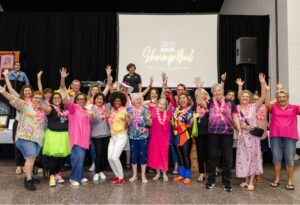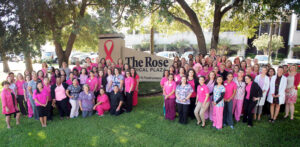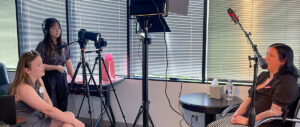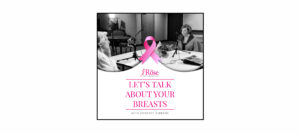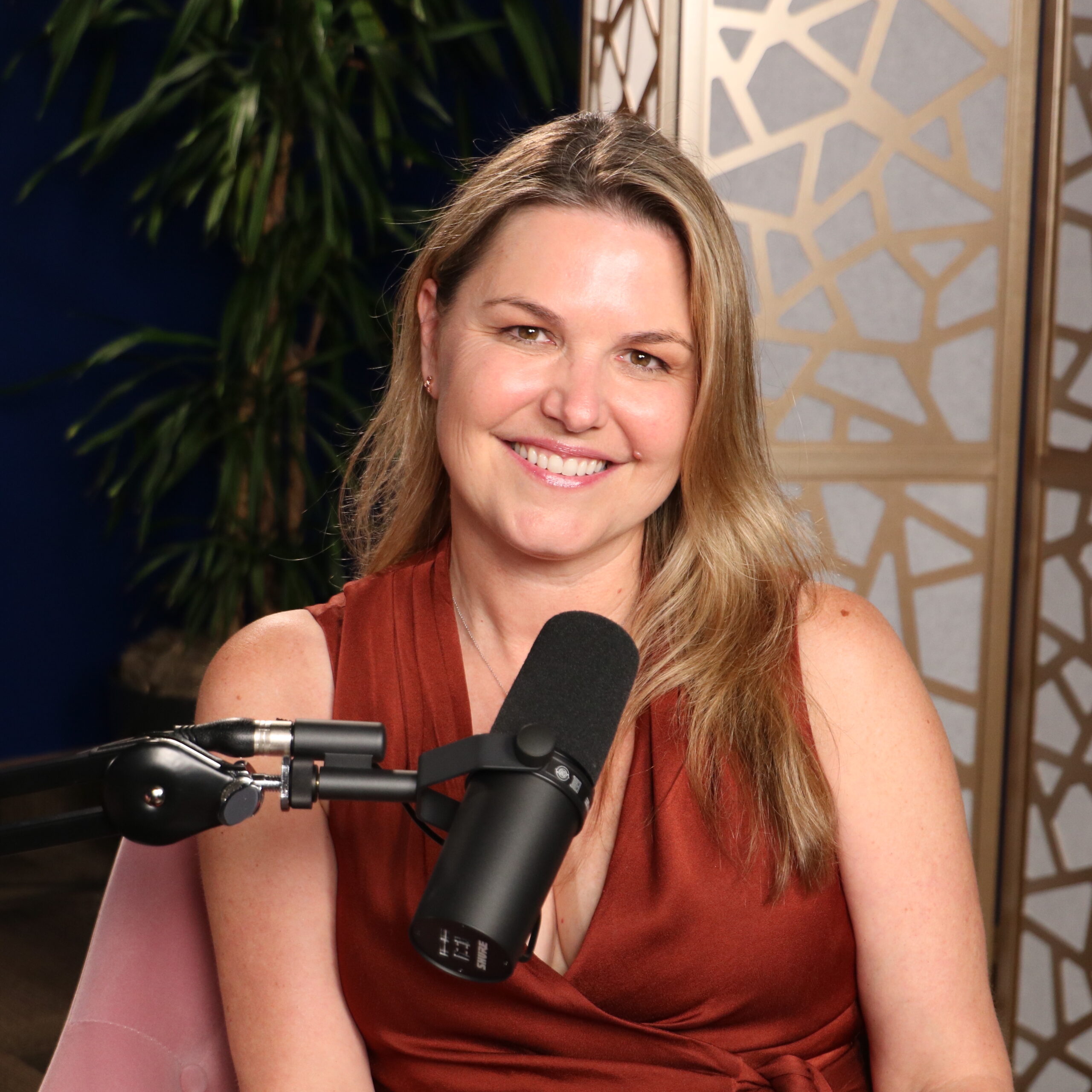Dorothy: [00:00:00] Janette Marx is a dynamic CEO running a multi billion dollar company that goes all over the world. She has had many, many successes, but perhaps her best success, or the one that means the most to her, was was finding a way to get through breast cancer. She taught us some incredible things and some of the things that I had never heard before, including make sure your doctor knows about your lifestyle. I’d never heard that. I couldn’t imagine being in a doctor’s office and saying, here’s my lifestyle. My treatment needs to work around it. But she’s going to tell us how she did it and why it’s so important to her recovery.
When you subscribe to our show, you help us grow. Someone you know may need to hear this story. So please, share with your family and friends. And consider supporting our mission. Your donation can help save the life of an uninsured woman.[00:01:00]
Let’s Talk About Your Breast. A different kind of podcast presented to you by The Rose, the Breast Center of Excellence and a Texas treasure. You’re going to hear frank discussions about tough topics, and you’re going to learn why knowing about your breast could save your life.
Thank you so much for being with us today. I am tickled that you’re here to talk about your journey and your experience. But first, tell us about your role as a CEO before you were ever diagnosed. Just tell us what, what all your job requires.
Janette: I would love to. So I am, uh, Janette Marx, the CEO of Airswift. And Airswift is a global workforce solutions company. We place engineers all over the world into the energy process and infrastructure industries. So we have contractors out in 71 different countries around the world. Um, so what that means is I get the joys of traveling and seeing different cultures and seeing the world [00:02:00] from a very different lens. So I’ve been to 50, I’ve been to more than 50 different countries, and before my diagnosis, um, it’s all about building my company, scaling my company, working with my teams, working with my clients, traveling, and really just being there and being fully present.
Dorothy: Oh my goodness.
Janette: Mm hmm.
Dorothy: So what got you into this business?
Janette: I fell into the world of workforce solutions. So it’s not something that anybody ever really goes to school for and says, that’s what I want to do when I grow up. I want to do recruitment or I want to go, you know, into helping people find jobs and really exploring their career aspirations. So I completely fell into it a long time ago. Um, and when I fell into it, I fell in love with it. And so it has been my absolute, you know, dream of a career. Um, I was 19 years with one company and I’ve been with Airswift for 10 years now.
Dorothy: All right. Go to your diagnosis. Tell us about how that even came about. I think that’s a fascinating story.
Janette: [00:03:00] Yeah. So I, for the last eight years, I’ve been on the CEOs Against Cancer and that’s here in the Houston area where I joined it as a founding member because I really wanted to put health and wellness at the forefront of what we do, um, for all of our employees.
And so every CEO I’m on that with, we’re out there preaching early screening, early detection. Do, do all the things, right. You know, everything about all of our walks and our health and our wellness. So I’ve been an ambassador sharing that. Um, for that many years. Out in Papua New Guinea, to different countries, where we supported 29 different cancer societies. So I feel like that was a blessing in disguise for me, because what that meant was, uh, I did my mammograms every year like clockwork. I did not miss it. I made sure I was always getting my mammogram at the scheduled time. And, um, in November, December of, uh, 2022, I went in and got a mammogram and then I got a call back.[00:04:00]
And they said, we think we need you to come back in. We didn’t get a clear image. So I thought nothing of it. I just thought they didn’t get a clear image and you know, the tech was new or, you know, they just did it again, whatever it may be. Okay. So I went back in in January and after Christmas and that time the tech had me go back and forth into the room four different times.
And I looked at her and I said, you found something. I’m like, you’re looking for something. And she was like, well, Janette, yes, we just really need a good image on this side. And then they came back out and said, we need you to go in and get an ultrasound. I was there for four hours, um, working through it all. My mammogram caught my, my, my breast cancer, my mammogram saved my life. So it wasn’t something I could feel at the time. Um, it wasn’t something my doctors felt after my annual exam. So it was really the mammogram that caught it.
Dorothy: We’re talking very early, and we’re talking lots of options for treatment. But I think that [00:05:00] one of the things I’ve heard you say is, you had a friend who said when you go to talk to the oncologist, you have to tell him or her about, about you. I’ve never heard that advice before, so explain how that came around.
Janette: So we’re all people. Our doctors are people too. And when, when I found out that I had stage two breast cancer and I went into my MRI and um, we were, I was getting more and more information as it went. One of my really dear friends is a doctor. And so, um, I pulled her in immediately and I’m like, ah, I need to talk to you. What do I do? You know, cause it’s nothing that you ever think is going to hit you. It’s just, it’s always a surprise. You’re like, what? I’ve done everything right. I exercise, I eat clean, like I’ve done everything right.
And, and she was such a good friend to me through this process. And her piece of advice was when you go to your very first appointment, the doctor needs to know you. The doctor needs to know Janette, [00:06:00] not Janette the patient, but Janette, who you’re all about, what you’re all about, your family, your volunteer work, what you do for work, like everything about you, how you travel, just let them know you as a person.
And so I took that advice. And, um, the first time I met with Dr. Emily Robinson, um, who was my surgical oncologist. Amazing. Um, and love her to death. And the first time I met with her, we sat down and I just shared with her and then she shared with me more about her and her practice and what she does. And it led to a completely different first quote meeting with an oncologist where we were able to really map out what my treatment needed to be.
Like she pulled up the MRI scan. She showed me in detail. We went through the, we went through all the things you do medically, but it felt like I was talking to a friend. It felt like I had a friend next to me who was lock in arms with me and we were going to go on this journey together.
Dorothy: And you really [00:07:00] had great information coming from her. You didn’t, you didn’t feel like you had to re-ask her.
Janette: No, I, I had, um, researched her ahead of time, of course, and asked other people who had gone through this and gotten feedback and gotten references. And all of that was, of course, very, very good. So I went into it hopeful that, this would be my oncologist because that’s the other thing that women need to think about. You can choose your doctors so you can choose them. So if you don’t feel like you have the right connection, if you don’t feel like they’re the right person, go to another doctor. You here in the US, we have the right to choose. So you can choose your doctor. Um, and I have another friend who went through this at the same time as me and she did just that like the day before she was supposed to go in for an operation, she didn’t feel right about it and she switched her doctor team up.
And she ended up in a great place. So you just, you, you sometimes need to understand that you do have a little bit of control through this, um, in some of the decisions that you get to make. And it’s okay [00:08:00] to, to lean into that and make the decisions that make you feel comfortable.
Dorothy: Oh, that is such great advice. And to ask the questions. And if you’re not getting answers, then be sure to. Go back and ask again.
Janette: That’s right.
Dorothy: I have never heard that advice in all these years. I’ve never heard someone say, tell them about you.
Janette: Yeah.
Dorothy: That’s a really important.
Janette: I have my three main doctors. I have their cell phone numbers.
Dorothy: Ah!
Janette: Could text them when I needed something, but it’s, I got close to them and I, I made sure with all three of them, my medical oncologist, and then my plastic surgeon for my reconstruction— that we were in this together and I felt that with them. So I felt like they had my best interest in mind and I felt like I just had a team that surrounded me to help me stay positive and really just fight this in a way that would make me stronger when I got through it than when I entered it.
Dorothy: So tell me about the rest of your support system.
Janette: Yeah. Uh, my support system is wonderful. So I have been [00:09:00] married for 29 years. Um, and my husband was there with me every single step of this. So from the very first moment when I, okay, so when you do four hours of mammograms and, and, uh, ultrasounds and you go home, I sat in my car and I cried for quite a while. Um, they didn’t tell me I had breast cancer then, but you kind of just knew. And then you like look up like the probabilities and says less than 3%. And I’m like, no, the radiologist was pretty direct and they wouldn’t let me leave without scheduling the biopsy. And so by the time I got home at a, make sure I was good to drive, by the time I got home then I saw my husband, he just hugged me and he’s like you’re gonna be fine. You don’t know yet. We got to take one day at a time. So when you have a support system like that, it really helps you just position to get through it all. Deciding when to tell our son and his he just got married last month our son and his his wife that was hard too because you don’t [00:10:00] want them to be worried about you.
So when you’re in, in a position of where you’ve got people around you that love you, you just, you want to be able to carry the burden, but in part, you need to be able to share it so that they can support you and you allow them to support you. So finding the right timing for that, there was no right or wrong answer to that. But we waited till we had a little bit more information. We waited till I had my biopsy. We waited till after that. And I knew for sure that it was cancer. And then I told my, my son and his wife who, again, absolutely wonderful people. So they’re in their 20s. My son had worked in medical for a bit, so he had a little bit better of a temperament about it, um, and understood a little bit more.
And then I went to my family, my sisters, my mom, my dad, like my, my, my, especially my sisters who I was like, go get your mammograms or you up on it. Um, and so, as you start to spread out and tell, like first it was just family. I’m like, I need to get my MRI next. I didn’t tell work yet. Cause I was like, I don’t know what the treatment’s going to be. I don’t know what it means. [00:11:00] And I don’t like living in, um, the unknown. When you live in the unknown, people always tend to go to the worst case scenarios.
Dorothy: Oh, true.
Janette: And, and so it’s really hard. You’ve got to practice really hard in your mind to get your mindset right, to not go there and to stay positive and to know if you don’t know it, it doesn’t mean it’s the worst case scenario. It could be the best case scenario. And you’ve got to stay focused on that to help yourself, you know, get through a place and be in a place of healing. And so once I met with my oncologist and actually understood what I had and what the possibilities were, I didn’t know if I was going to need radiation, chemo, you know, I didn’t know everything else yet. We had more tests that we needed to run. But I did know that, um, I had three tumors. One, one was growing. Um, and, uh, she was like, we need to get it out of you, um, right, you know, right away. And so three days later, I get a call from her and she’s like, can you get, can you come in a week? [00:12:00] We have an opening. And I was like, Oh crap. Okay, I guess this means I need to tell everybody at work. Ha ha ha ha! Because I’m going to go into surgery and if I’m going to do a mastectomy. Okay.
Dorothy: Yeah, you might be absent just a tiny bit there.
Janette: I might be out for a minute. So, I shared with my direct reports, I shared with my board, shared with my chairman. And again—
Dorothy: How did you share? I mean, that’s just a—
Janette: I was just—
Dorothy: You have this huge team around you. You have this huge, uh, workforce.
Janette: It’s kind of interesting. So on my board, the men I shared with one to ones, I shared with my chairman and I shared with my private equity company. We’re private equity backed. And I allowed them to, of course, share with the rest of the board. For my direct reports, I shared one to one with my, um, male direct reports. And then I pulled all the females in together and we actually had almost like, I don’t know, there was 10 of us in my room in my office and we had, and not all of them were direct reports, but they’re all people that work [00:13:00] with me on a regular basis.
And I had a heart to heart with them and it was emotional, but we had like, I had a different message for them than I did for the men because for them I was like, okay, you’re all different ages. Have you all gotten your screening? You know, where are you at with taking care of yourself? And so it turned into kind of a lesson of everybody leave and go get your mammogram scheduled.
You don’t know where you’re going to be. You don’t know what’s going to happen. We’ve got to get this taken care of. And we, we opened it up to have like just an open conversation about what does it mean? What What are the next steps? And I’m like, you know what? I don’t know what all the next steps are going to be, but I know that I’m going to get through it because I have all of you supporting me. And their support in the way they rose above. That’s all you need when you’re, when you’re going through a time like this, because never in my life, never in my career have I had to step out and say, I can’t be there. And knowing what I was going to go through and knowing what the [00:14:00] reconstruction, like the reconstruction was going to be in front of me no matter what.
And that’s a really in depth, you know, surgery where you’re out for a while. I was like, okay, I’ve got to pull on my succession plan and my emergency, uh, lever is CEO and you guys all need to step up and, and here you go. And they did it. Um, but I was real, I was me, I was authentic. I was, you know, it’s just, I was honest. And, um, when you’re, when you’re honest, I don’t know, you, you find others just champion, step up.
Dorothy: We hear that a lot, but it’s true.
Janette: It really is. It really is. I mean, I’ve, I helped a lot of other people, especially this past year through their different cancers diagnoses. And, um, it’s amazing how many people want to keep it to themselves and not share, even as they’re going through it at work. And I think that’s fear speaking. And, because there is fear that, well, they look at me different, will I not get the right assignments? Well, you know, how will it, how will it [00:15:00] come? And I think when you really put yourself out there and let those around you support you, you’d be surprised at how much people step up and how much support you really can get.
Dorothy: Oh, that’s such a great message.
Janette: Yeah.
Dorothy: One we don’t often hear. No.
Janette: No. Yeah. It’s just, it’s, it surprised me at how many, cause even me as I was going through it, I didn’t know when I wanted to share, you know? And it’s, it’s a lot in the beginning for yourself to process and for you to get your mind around. And still, I mean, today I still pinch myself, I’m like, did I go through that? Did that just happen? Did I really have cancer? So you know, you’re still like wrapping, giving yourself time to wrap your mind around it, but then giving yourself the opportunity to let others help you through it. Is, is, I don’t know, giving them space to, to feel good in, in the support they can give.
Dorothy: So now you’re basically through treatment.
Janette: Yes.
Dorothy: And back at work.
Janette: I am. Yeah.
Dorothy: A hundred percent.
Janette: Oh yeah.
Dorothy: Running just like you did before.
Janette: Oh, even [00:16:00] better. I think even more.
Dorothy: Oh. So what do you think is the difference between you then and you now?
Janette: I am a workaholic. I put my everything into my work and my people. And um, I don’t think. throwing myself into my work, throwing myself into my people is ever going to change. But now I see life and every day as a blessing. Every day is a blessing. And the things that happen, there’s challenges that happen every day in work, in life, with friends, in the community, whatever it may be, there are always challenges that come up. And I just see these challenges as, okay, it’s like, It puts, it almost puts you in a different, like, framework of how to just overcome the, the, the issues that arise, whether they’re small or big. It’s like, we got this.
Dorothy: You don’t even categorize them, you just say,
Janette: It’s all right.
Dorothy: It’s all right.
Janette: Yeah.
Dorothy: I got it.
Janette: Let’s work through it.
Dorothy: Yeah.
Janette: Not even that. It’s like, all right, this big issue happened in whatever country [00:17:00] or whatever’s going on. All right. Let’s get the team together. Let’s work through it. What do we need to do? What have we not done? You know, how can we look at this differently? You know, how do we put our plan together? And it’s just, it’s nothing to get upset about. It’s nothing to get riled up about. It’s life. It happens. And you know what? I’m blessed to be living that life. So, I am so happy. And it’s okay.
Dorothy: And you can tell. So now that you’re through, uh, what lies ahead for you in, in your cancer experience? What, what’s next?
Janette: Um. So, from a personal point of view, any woman who’s gone through breast cancer knows for five years you continue to get your hormone therapy. So I’m in the throes of all of that, um, which brings on a whole nother onset of, uh, exciting woman issues that we get to go through like menopause. So all of that comes out. So personally, I’m just going through my journey. I’m seeing my oncologist on a regular basis, getting my blood work, getting all my tests, making sure that I am exactly where I need to be in [00:18:00] doing everything she tells me to do to reduce the risk of cancer ever coming back. So I am following her advice and I am making sure that I’m in a, in, in a good place.
I did, um, I will say this. I did opt for a double mastectomy. I did not have to get one. I only had cancer on one side and. We debated that and that was 100 percent my choice to decide, do I want to just do my unhealthy side or do I want to go for a double? I did it for risk mitigation reasons. I did it for peace of mind.
When I got all the stats of the likelihood of cancer being on my healthy side, I fast forward and went life in the future at 80 years old. I don’t want to deal with this. I don’t want to be back here fighting this and dealing with this and I won’t be as strong as I am today. So I opted for the double.
Dorothy: A difficult decision for, for anyone.
Janette: It’s an incredibly difficult decision. It was the best decision I have ever made. [00:19:00] When my surgical oncologist, um, did my, my healthy side, they found cancer that was undetected in my healthy side.
Dorothy: Oh my.
Janette: It was. It was a little bit of an insane process to sit in front of her and understand while through my recovery that they had found cancer growing on my healthy side that the MRI, the mammogram, the ultrasound did not detect.
So I know I made the right decision. Um, and I will continue to do what I need to do to make sure that I de risk, you know, cancer ever flaring up again. Now from my go forward and to like, just, Just trying to raise awareness for this all. Um, I love my work with CEOs Against Cancer. We helped build the Hope Lodge, um, here in Houston. We’re giving a home away from home from those who come to our great city, um, for treatment and for their caregivers. Um, and, um, I am, um, speaking more, I’m trying to put myself out there more. Um, it’s [00:20:00] been hard this year because I’m hitting the year anniversary of a lot of my big events. And that’s where I have felt a little bit of the more of the emotion coming through. Um, as I went through it, I was more headstrong and charging ahead and let’s go tackle this and tackle this. Now I’m processing and, and that’s been a little bit of a different experience for me as well, but I want to help others.
Dorothy: But that is so important. I mean, if we don’t take time to process. Even when you can’t, at the stage you’re in, going through it. But I think that’s a really important message. It’s not always just over. It is not. It’s like, I know.
Janette: It’s never over. And, I mean, two, two to three months after my diagnosis, um, one of my employees got the same exact breast cancer I did. And I just, here’s everything I had, gave everything, and like, we’re warrior sisters together now. Here we go. I mean, yesterday I got a, um, an email [00:21:00] from another, from one of my nonprofits, another colleague who knew I went through it and said her best friend just got diagnosed. What can she do for her? I sent her a long email with a list. This is what you do for her. You know, this is what she needs.
Dorothy: We want you to share that list with our, with our listeners. I mean, it. You know, there’s so many things that in the healthcare world, we think that’s just what happens. But I’m helping someone right now who is a friend in another state. No one’s talking to her. I’m just amazed. And, you know, I’m telling her, here’s what you gotta ask. And sometimes that’s what we need. Tell us exactly what we need to ask, do, have.
Janette: Absolutely. It’s the loneliest place to be. So, when you’re, when you feel it, And you, like, there are more cancer patients who feel like loneliness is the hardest thing sometimes for them to overcome. So if you know somebody with cancer, don’t think you’re bothering them.
Reach out to them. Text them daily. Send them notes. Send them old school notes. Send them, like, it doesn’t matter. [00:22:00] Just the little acts of kindness are, are things that just help them build connection. And they need that connection as they work through it, because that helps them stay positive. That helps them have something to look forward to.
Um, and there are so many things that you can do to help people out. So many beyond food. So everybody goes to food. Everybody needs food. That’s good. Beyond food though. There are so many other examples. So an example, breast cancer. The, the robes that you need to wear after your surgeries are the robes with interior pockets.
Um, women end up with drains after their surgeries and they need a comfortable place to put them and, and to, to have them out of, you know, way of how we move. So, Brobe, B R O B E, is one of my favorites. Um, so shout out to them. But you can find them on Amazon. You can find them anywhere where they have the interior pockets. Um, those are important.
Pillows. The way that we need pillows, um, that are, are the ones [00:23:00] that you can lay where you’re laying up front still so the wedges you need wedges. You need, if you think about flying on an airplane and like the pillows that you put around those pillows. You’re gonna think about them differently for breast cancer put them under your arms.
I had lymph nodes removed my arms hurt to move. I put those airplane pillows underneath my arms, and I had an aunt who made some that were super, super special, uh, with the breast cancer stuff and everything on. But you need, you need a place to rest your arms and to know that you’re not gonna hurt if you’re just naturally going back down.
There are little things like that, um, that are just absolutely any woman going through, it’s going to need that. Um, and I would say some of my close friends were great with the texts from not just saying, I would pray for you, but sending me their prayer in text, not just saying, you know, good luck today, but coming up with a fight song and sending me my fight song because you’re scared when you go into surgery, you know. So when you go into surgery that morning you wake up, you’re like, Oh, this is going to be a [00:24:00] day. And to know that you’re going to the hospital and you got your fight song and you’re getting your mindset into the right, the right frame of mind of, I got this, you know, so you just, it’s things to help.
Like there, there are. There are no cost things you can do for your friends and then there are things that you can do where you show your acts of kindness through sending stuff. So whatever it may be, just do, don’t ask, just do. And don’t expect a text or an, or, or anything back from the person going through it, but know they’re going to receive it at the time that they need it. Because when you’re medicated, when you’re going through it all, it’s just, it’s just, give them the time to, to relax. Even if they, if it gets lost in the series of them, keep sending them messages because that’s what they need.
Dorothy: Wow.
Janette: Yeah.
Dorothy: Such great advice. Thank you so much for sharing everything. I think we could talk another two hours just on what people could do, but. Great story. Thank you so much for being with us today.
Janette: Thank you for having me.
Post-Credits: Thank you for joining us today on Let’s Talk About Your Breasts. [00:25:00] This podcast is produced by Speke Podcasting and brought to you by The Rose. Visit therose.org to learn more about our organization. Subscribe to our podcast. Share episodes with friends and join the conversation on social media using #LetsTalkAboutYourBreasts. We welcome your feedback and suggestions. Consider supporting The Rose. Your gift can make the difference to a person in need. Remember self care is not selfish. It’s essential.


